liver support
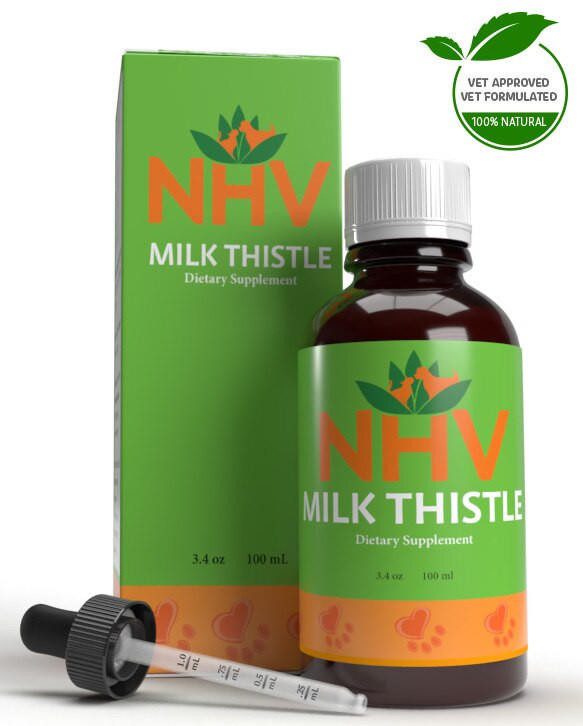
free shipping over $100 (USA & Canada)
1-877-937-4372 the pet expert hotline
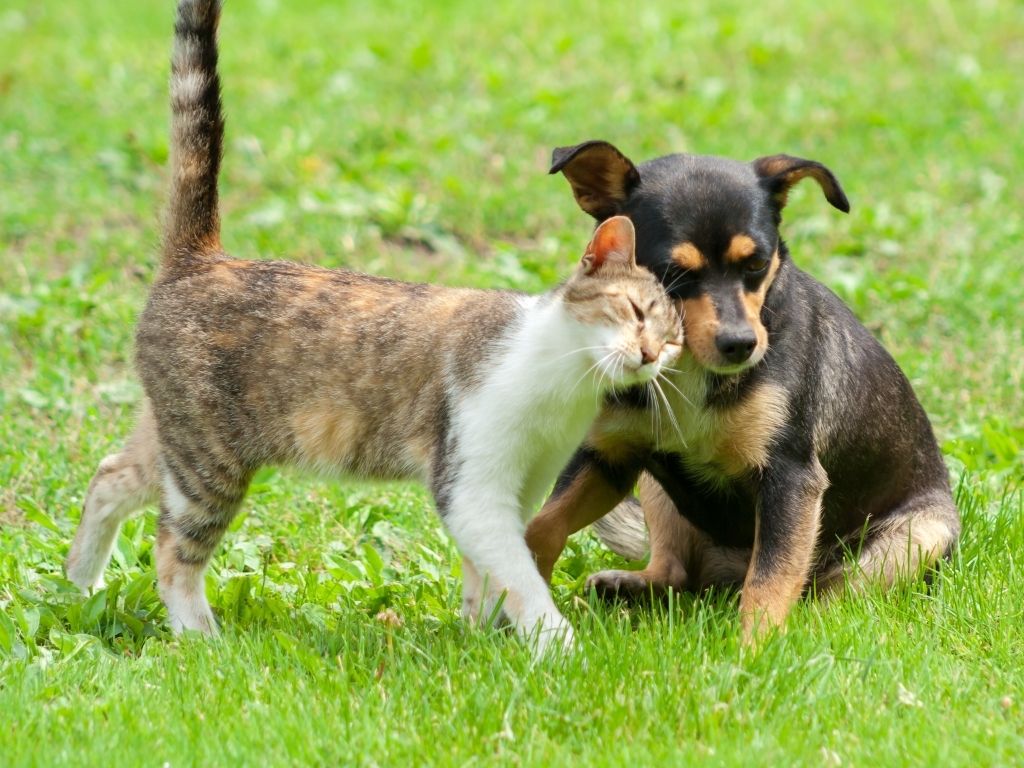
Acute liver failure in dogs and cats is the loss of liver function that occurs rapidly (in days or weeks). It usually appears in pets that have no pre-existing liver disease. Chronic liver disease occurs gradually and can be caused by an ongoing health condition.
In cats (particularly obese), a simple lack of appetite (anorexia for 2 or 3 days) can result in a very serious condition called hepatic lipidosis, resulting from excessive accumulation of fat in liver cells.
There are many possible causes of liver disease. Sometimes a definitive diagnosis cannot be made. It can be caused by hepatitis virus, drugs, such as acetaminophen, ingestion of toxic substances, changes in blood supply to the liver resulting from heart disease or a congenital abnormality, cancer, diabetes, etc.
In cats (particularly obese) a simple lack of appetite (anorexia for 2 or 3 days) can result in a very serious condition called hepatic lipidosis, resulting from excessive accumulation of fat in liver cells.
The most common symptoms of liver disease are:
Other disease symptoms associated with the liver may also be ascites (accumulation of fluid in the belly), pale mucous membranes associated with bleeding problems, etc.
These symptoms may appear suddenly or develop slowly. Other diseases can cause similar clinical signs and it is very important that a veterinarian examine your pet.
It is diagnosed by testing the liver function through a complete blood count test. To check for liver damage, CT scans and MRIs are helpful. Also, a liver biopsy may be necessary, which involves removing a small liver sample and examining it for signs of damage or disease.
Liver failure is a life-threatening condition that demands urgent medical care!
The goal of the treatment is:
Surgery may be an option for dogs and cats with tumors or cysts.
Liver diseases cause changes and the destruction of liver cells. Fortunately, the liver has a large reserve capacity and, unlike other organs in the body, it has the ability to regenerate.
The goals of dietary therapy are to decrease symptoms related to liver failure and, at the same time to optimize liver regeneration conditions. This type of diet provides the body with optimal amounts of proteins, carbohydrates, fats, vitamins, and minerals, ensuring balanced nutrition, and reducing the work of the liver. The energy in the diet should come from easily digestible carbohydrates and high-quality fats.
During this time, your pet must consume only a special diet. Your pet’s recovery largely depends on adherence to the diet. Most animals get used to the new diet if it is introduced slowly and the routine and eating habits are maintained.
The most common supplements used for liver failure are hepatoprotective such as Milk Thistle (to decrease the activity of aminotransferases) and antioxidants such as Turmeric.
NHV Milk Thistle: The main compound in this herb is silymarin, which helps prevent toxins from binding to the liver and helps the organ regenerate quicker. It has shown the ability to help scavenge free radicals and stabilize liver cell membranes.
NHV Turmeric: This rhizome is a member of the ginger family. It has been used extensively and is known to exhibit antioxidant, antiviral, antibacterial, and anti-inflammatory properties. An active ingredient found in turmeric, curcumin, contains several anti-inflammatory compounds and COX2 inhibitors. Therefore, it can be potent against inflammation in the liver.
liver support

100% Natural Liver and Kidney Detox and Cancer Support in Cats
buy 2 and save $3
3 month supply for a small to medium size pet
A popular herb among conventional and holistic veterinarians, Milk Thistle is often recommended for cats who have liver disorders, are fighting cancer, diabetes, kidney issues, gallbladder and bile duct issues, as well as hyperthyroidism.

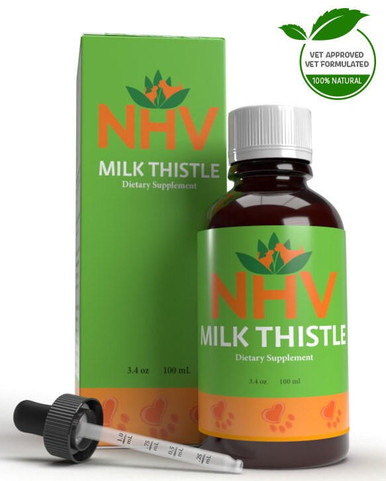
A popular herb among conventional and holistic veterinarians, Milk Thistle is often recommended for cats who have liver disorders, are fighting cancer, diabetes, kidney issues, gallbladder and bile duct issues, as well as hyperthyroidism.

Milk thistle, also known as Silybum Marianum is an herb that has been used for thousands of years by humans for its powerful medicinal properties. The active ingredient is Silymarin which contains flavonoids that have many beneficial properties including:
Milk thistle is one of the few herbs that have no equivalent in conventional medicine and has many uses. You can read about the many applications of Milk Thistle for cats and dogs on Dr. Hillary Cook's blog.
Milk Thistle for Liver Function
Milk Thistle for cats with liver disease is glycerin-based and safe for long-term use. This potent herbal formula provides excellent proactive support and can be taken in conjunction with conventional treatment.
Milk Thistle for Kidney Function
Milk Thistle for Anti-Cancer Support
Milk Thistle may also be beneficial to cats undergoing chemotherapy as Silymarium may enhance the activity of certain chemo drugs.
You can read Peachez's Story with Milk Thistle for cats and how it helped her with cancer and liver problems.
NHV’s certified organic Milk Thistle is a safe herb that is recommended and used by holistic practitioners. All of our products are all-natural and formulated by veterinarians with a focus on comprehensively supporting the health and well-being of your feline family member.
If you have questions about Milk Thistle or any of our plant-based products, ask an NHV expert because at NHV we want your kitty’s health to be purrfect!
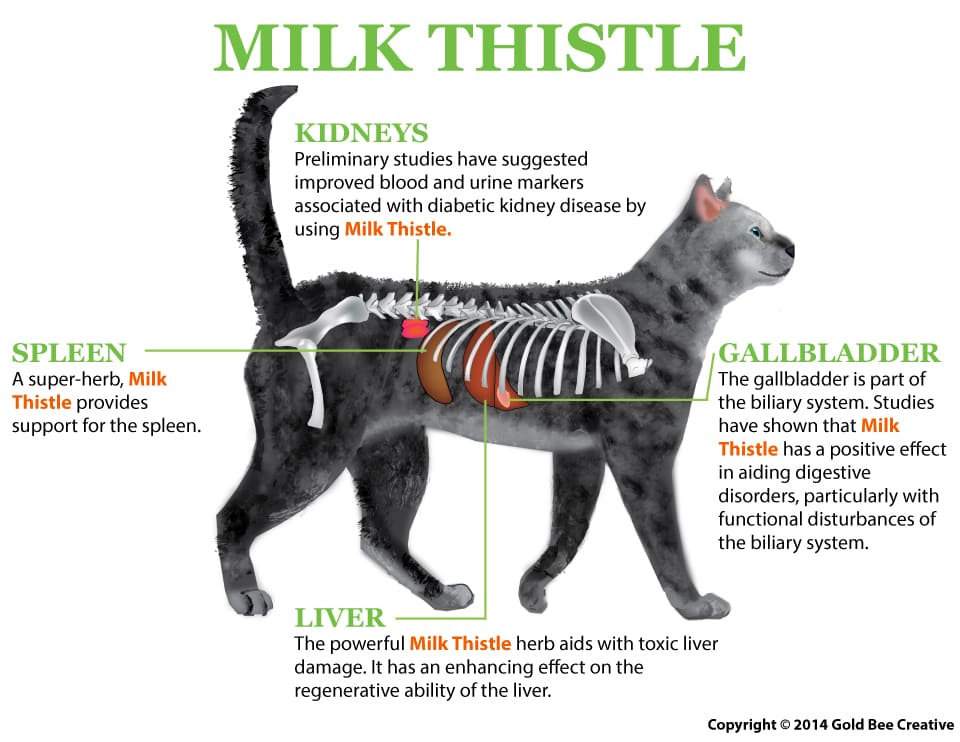
NHV’s Milk Thistle for Cats contains just one ingredient.
Select your pet's weight to determine the correct dose.
To be taken twice daily. Determine your pet’s weight and then use the easy chart below to determine the correct dose. This is the minimum dosage.
Pet's Weight Dosage
0 - 15 lb = 0.5 ml
16 - 30 lb = 1.0 ml
31 - 45 lb = 1.5 ml
46 - 60 lb = 2.0 ml
61 - 75 lb = 2.5 ml
Over 75 lb = 3.0 ml
How to Administer
Shake well before use. The easiest method is to use the dropper provide and places the drops into your pet’s food or favorite treat. You can also use the dropper and squirt directly into the pet’s mouth.
Some pets can be finicky, if this occurs consider hiding the drops in foods most pet’s love such as fish, chicken or yogurt or a favorite treat. If your pet only eats dry food then soak a few kibbles at feeding time.
For Best Results
Herbal dietary supplements are beneficial to the health and wellbeing of your pet and are safe for long-term use. Every pet responds to natural herbal supplements differently, therefore it is important to be consistent and administer the product daily. Supplements generally take two to four weeks to take effect, however this will vary from one animal to the next.
Product Storage
All NHV Natural Pet Products are pure herbal extracts and contain no artificial additives, preservatives or coloring. Shelf life after opening is 6 months and must be refrigerated after opening.
Cautions and Contraindications
Do not use Milk Thistle in pregnant or nursing animals. Speak to your vet before using our products. A second visit is recommended if your pet’s condition does not improve, or deteriorates after continued use of the supplements.
All information provided by NHV Natural Pet Products is for educational purposes only.
Milk thistle, also known as Silybum Marianum is an herb that has been used for thousands of years by humans for its powerful medicinal properties. The active ingredient is Silymarin which contains flavonoids that have many beneficial properties including:
Milk thistle is one of the few herbs that have no equivalent in conventional medicine and has many uses. You can read about the many applications of Milk Thistle for cats and dogs on Dr. Hillary Cook's blog.
Milk Thistle for Liver Function
Milk Thistle for cats with liver disease is glycerin-based and safe for long-term use. This potent herbal formula provides excellent proactive support and can be taken in conjunction with conventional treatment.
Milk Thistle for Kidney Function
Milk Thistle for Anti-Cancer Support
Milk Thistle may also be beneficial to cats undergoing chemotherapy as Silymarium may enhance the activity of certain chemo drugs.
You can read Peachez's Story with Milk Thistle for cats and how it helped her with cancer and liver problems.
NHV’s certified organic Milk Thistle is a safe herb that is recommended and used by holistic practitioners. All of our products are all-natural and formulated by veterinarians with a focus on comprehensively supporting the health and well-being of your feline family member.
If you have questions about Milk Thistle or any of our plant-based products, ask an NHV expert because at NHV we want your kitty’s health to be purrfect!

NHV’s Milk Thistle for Cats contains just one ingredient.
Select your pet's weight to determine the correct dose.
To be taken twice daily. Determine your pet’s weight and then use the easy chart below to determine the correct dose. This is the minimum dosage.
Pet's Weight Dosage
0 - 15 lb = 0.5 ml
16 - 30 lb = 1.0 ml
31 - 45 lb = 1.5 ml
46 - 60 lb = 2.0 ml
61 - 75 lb = 2.5 ml
Over 75 lb = 3.0 ml
How to Administer
Shake well before use. The easiest method is to use the dropper provide and places the drops into your pet’s food or favorite treat. You can also use the dropper and squirt directly into the pet’s mouth.
Some pets can be finicky, if this occurs consider hiding the drops in foods most pet’s love such as fish, chicken or yogurt or a favorite treat. If your pet only eats dry food then soak a few kibbles at feeding time.
For Best Results
Herbal dietary supplements are beneficial to the health and wellbeing of your pet and are safe for long-term use. Every pet responds to natural herbal supplements differently, therefore it is important to be consistent and administer the product daily. Supplements generally take two to four weeks to take effect, however this will vary from one animal to the next.
Product Storage
All NHV Natural Pet Products are pure herbal extracts and contain no artificial additives, preservatives or coloring. Shelf life after opening is 6 months and must be refrigerated after opening.
Cautions and Contraindications
Do not use Milk Thistle in pregnant or nursing animals. Speak to your vet before using our products. A second visit is recommended if your pet’s condition does not improve, or deteriorates after continued use of the supplements.
All information provided by NHV Natural Pet Products is for educational purposes only.
liver support
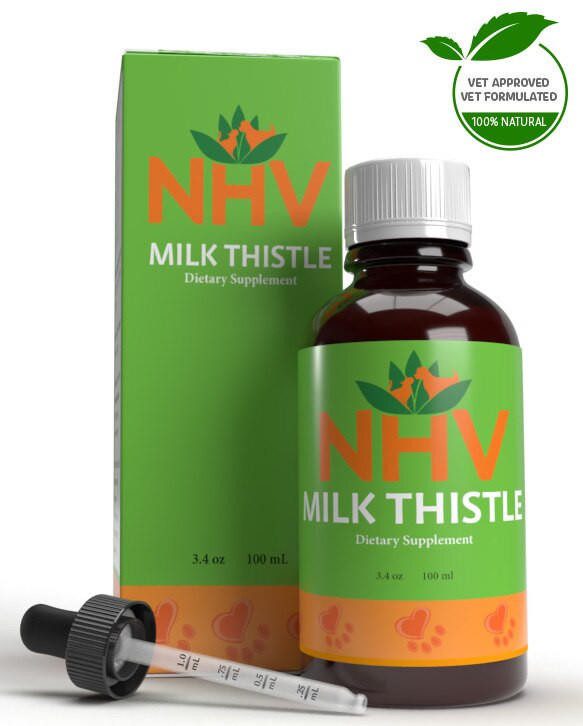
Support for liver and kidney detox and cancer support in dogs
3 month supply for a small to medium size pet
These effects help to remove chemicals and toxins that can accumulate in your dog’s system. It is one of the few herbs with no equivalent in conventional medicine.


These effects help to remove chemicals and toxins that can accumulate in your dog’s system. It is one of the few herbs with no equivalent in conventional medicine.

Milk Thistle is a powerful herb that’s been used by humans for thousands of years. The active ingredient, silymarin, has been shown through scientific studies to possess strong anti-inflammatory, antioxidant, and detoxifying properties. It also promotes cellular regeneration and repair.
This supplement by NHV Natural Pet Products uses 100% natural milk thistle to support dogs through liver and kidney conditions in addition to conventional treatment by their veterinarian.
Milk thistle improves kidney function due to the damage from:
The extraordinary antioxidant properties of milk thistle for dog extract acts to:
The scientific name for milk thistle is Silybum Marianum. It’s also referred to as wild artichoke and holy thistle.
Milk thistle for dog liver support can be used in conjunction with conventional treatments and is glycerin based and safe for long-term use. You can read more about the benefits of using milk thistle on Dr. Hillary Cook’s blog.
At NHV, all of our products including milk thistle for dog kidney support are plant-based and make excellent proactive support for many health conditions. If you have questions on milk thistle for dogs or any of our holistic supplements, you can ask an expert at NHV because we put your pet first when it comes to health and healing naturally.
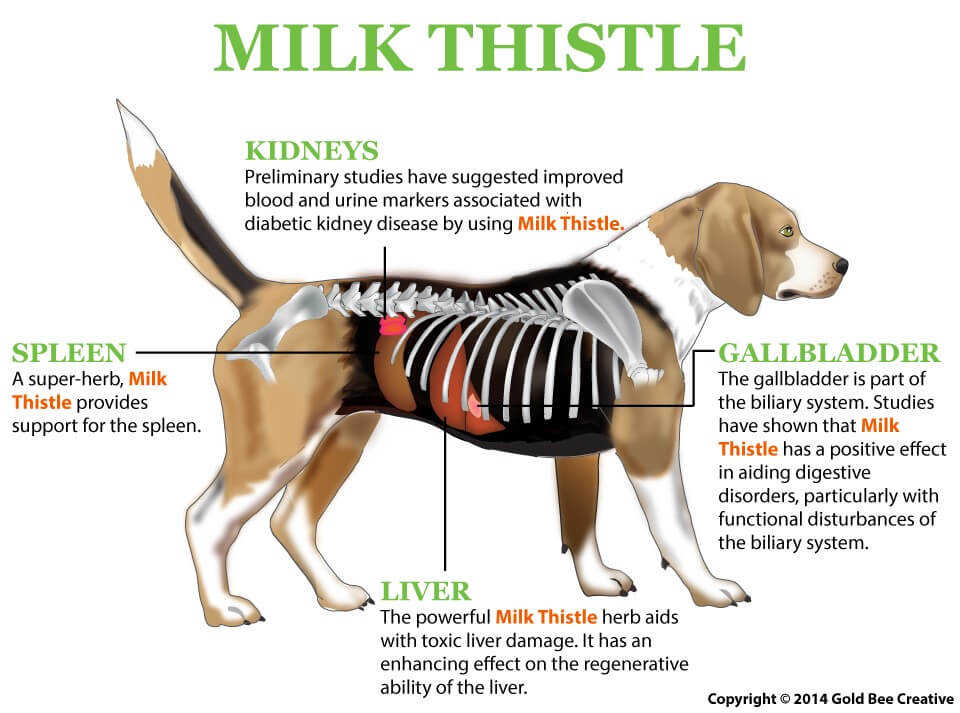
Select your pet's weight to determine the correct dose.
To be taken twice daily. Determine your pet’s weight and then use the easy chart below to determine the correct dose. This is the minimum dosage.
Pet's Weight Dosage
0 - 15 lb = 0.5 ml
16 - 30 lb = 1.0 ml
31 - 45 lb = 1.5 ml
46 - 60 lb = 2.0 ml
61 - 75 lb = 2.5 ml
Over 75 lb = 3.0 ml
How to Administer
Shake well before use. The easiest method is to use the dropper provide and places the drops into your pet’s food or favorite treat. You can also use the dropper and squirt directly into the pet’s mouth.
Some pets can be finicky, if this occurs consider hiding the drops in foods most pet’s love such as fish, chicken or yogurt or a favourite treat. If your pet only eats dry food then soak a few kibbles at feeding time.
For Best Results
Herbal dietary supplements are beneficial to the health and wellbeing of your pet and are safe for long-term use. Every pet responds to natural herbal supplements differently, therefore it is important to be consistent and administer the product daily. Supplements generally take two to four weeks to take effect, however this will vary from one animal to the next.
Product Storage
All NHV Natural Pet Products are pure herbal extracts and contain no artificial additives, preservatives or coloring. Shelf life after opening is 6 months and must be refrigerated after opening.
Cautions and Contraindications
Do not use Milk Thistle in pregnant or nursing animals. Speak to your vet before using our products. A second visit is recommended if your pet’s condition does not improve, or deteriorates after continued use of the supplements.
All information provided by NHV Natural Pet Products is for educational purposes only.
Milk Thistle is a powerful herb that’s been used by humans for thousands of years. The active ingredient, silymarin, has been shown through scientific studies to possess strong anti-inflammatory, antioxidant, and detoxifying properties. It also promotes cellular regeneration and repair.
This supplement by NHV Natural Pet Products uses 100% natural milk thistle to support dogs through liver and kidney conditions in addition to conventional treatment by their veterinarian.
Milk thistle improves kidney function due to the damage from:
The extraordinary antioxidant properties of milk thistle for dog extract acts to:
The scientific name for milk thistle is Silybum Marianum. It’s also referred to as wild artichoke and holy thistle.
Milk thistle for dog liver support can be used in conjunction with conventional treatments and is glycerin based and safe for long-term use. You can read more about the benefits of using milk thistle on Dr. Hillary Cook’s blog.
At NHV, all of our products including milk thistle for dog kidney support are plant-based and make excellent proactive support for many health conditions. If you have questions on milk thistle for dogs or any of our holistic supplements, you can ask an expert at NHV because we put your pet first when it comes to health and healing naturally.

Select your pet's weight to determine the correct dose.
To be taken twice daily. Determine your pet’s weight and then use the easy chart below to determine the correct dose. This is the minimum dosage.
Pet's Weight Dosage
0 - 15 lb = 0.5 ml
16 - 30 lb = 1.0 ml
31 - 45 lb = 1.5 ml
46 - 60 lb = 2.0 ml
61 - 75 lb = 2.5 ml
Over 75 lb = 3.0 ml
How to Administer
Shake well before use. The easiest method is to use the dropper provide and places the drops into your pet’s food or favorite treat. You can also use the dropper and squirt directly into the pet’s mouth.
Some pets can be finicky, if this occurs consider hiding the drops in foods most pet’s love such as fish, chicken or yogurt or a favourite treat. If your pet only eats dry food then soak a few kibbles at feeding time.
For Best Results
Herbal dietary supplements are beneficial to the health and wellbeing of your pet and are safe for long-term use. Every pet responds to natural herbal supplements differently, therefore it is important to be consistent and administer the product daily. Supplements generally take two to four weeks to take effect, however this will vary from one animal to the next.
Product Storage
All NHV Natural Pet Products are pure herbal extracts and contain no artificial additives, preservatives or coloring. Shelf life after opening is 6 months and must be refrigerated after opening.
Cautions and Contraindications
Do not use Milk Thistle in pregnant or nursing animals. Speak to your vet before using our products. A second visit is recommended if your pet’s condition does not improve, or deteriorates after continued use of the supplements.
All information provided by NHV Natural Pet Products is for educational purposes only.
arthritis support
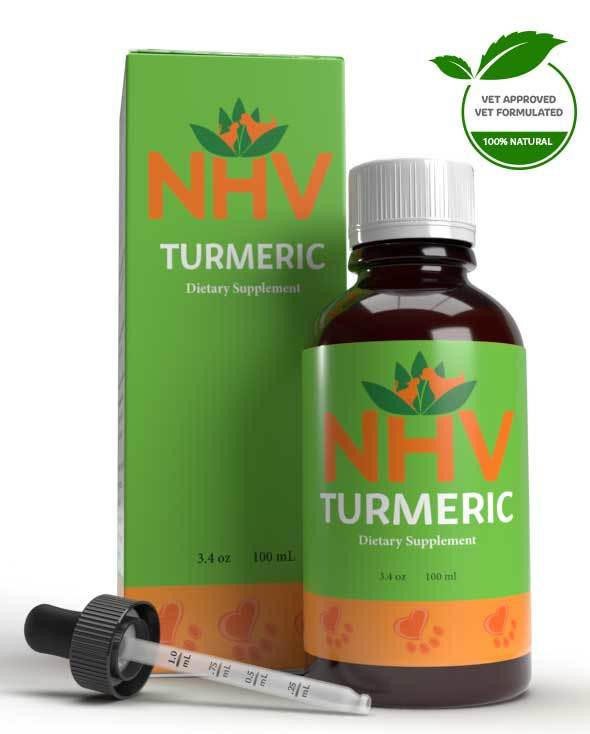
For Arthritis and Cancer Support
buy 2 and save $3
3 month supply for a small to medium size
Dogs love to root around in the dirt for goodies. But did you know one of the best things they could find would be turmeric? Turmeric for Dogs is a natural, antioxidant-rich supplement that supports your pup’s overall wellness.
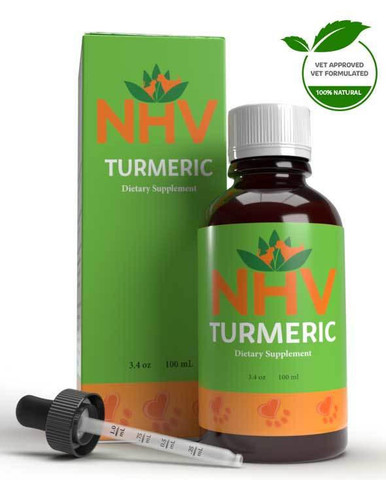
Dogs love to root around in the dirt for goodies. But did you know one of the best things they could find would be turmeric? Turmeric for Dogs is a natural, antioxidant-rich supplement that supports your pup’s overall wellness.
Sadly, your pup won’t find turmeric in their backyards unless you live in the tropics, where this amazing plant grows. However, they can benefit from this golden plant by taking a full-spectrum extract of Turmeric for Dogs.
Is turmeric good for dogs? Yes, most pups can use this safe and gentle herb for a number of health concerns. This is thanks to the organic compounds produced by the plant.
If you’re the pet parent of a sick pup, you might have a challenging journey ahead. Remember that love you feel for your dog will also play a big role, and if you need a little advice, our pet experts are here for you and can be reached by chat.
How does this incredible spice work? Turmeric is rich in antioxidants, which can help your precious pet with stress, pollution, and illness. In the body, Turmeric has the potential to help with both overall.
Pets that are sick have increased oxidation, so the antioxidants they get from food, medication, or supplements can help give them the extra they need.
As pet-parents ourselves, we know you only want the best for your pup. That’s why our extracts are made from human-grade, high quality ingredients. And when you choose NHV Turmeric, you’re choosing decades of holistic pet wellness experience from vets and herbalists who can help support your pet’s wellness journey. Our formula is:
Our turmeric was formulated by a master herbalist and holistic vet. Learn more about Dr. Hillary Cook’s use of turmeric and its benefits for pet health. We are also proud to have been a part of many dog success stories, like with our doggo friend, Captain Morgan.
Captain Morgan’s story: “Our bloodhound has been on turmeric for 2 months now. He has been getting up and down more smoothly and not as stiff in his backend. He loves the taste and we love how it has helped him
You can add daily supplements like Turmeric to top up your dog’s intake of natural, wellness-promoting ingredients. It can be given directly by mouth with the dropper provided, or it can be mixed into food or a favorite treat (this tip is dog-approved)!
All NHV supplements are made with the finest quality organic or ethically harvested herbs. We use non-GMO vegetable glycerin as our base. NHV products are full-spectrum extracts.
Select your pet's weight to determine the correct dose.
To be taken twice daily. Determine your pet’s weight and then use the easy chart below to determine the correct dose. This is the minimum dosage.
Pet's Weight Dosage
0 - 15 lb = 0.5 ml
16 - 30 lb = 1.0 ml
31 - 45 lb = 1.5 ml
46 - 60 lb = 2.0 ml
61 - 75 lb = 2.5 ml
Over 75 lb = 3.0 ml
How to Administer
Shake well before use. The easiest method is to use the dropper provide and places the drops into your pet’s food or favorite treat. You can also use the dropper and squirt directly into the pet’s mouth.
Some pets can be finicky, if this occurs consider hiding the drops in foods most pet’s love such as fish, chicken or yogurt or a favorite treat. If your pet only eats dry food then soak a few kibbles at feeding time.
For Best Results
Herbal dietary supplements are beneficial to the health and wellbeing of your pet and are safe for long-term use. Every pet responds to natural herbal supplements differently, therefore it is important to be consistent and administer the product daily. Supplements generally take two to four weeks to take effect, however this will vary from one animal to the next.
Product Storage
All NHV Natural Pet Products are pure herbal extracts and contain no artificial additives, preservatives or coloring. Shelf life after opening is 6 months and must be refrigerated after opening.
Cautions and Contraindications: Do not use Turmeric in pregnant or nursing animals. Speak to your vet before using our products. A second visit is recommended if your pet’s condition does not improve, or deteriorates after continued use of the supplements.
Sadly, your pup won’t find turmeric in their backyards unless you live in the tropics, where this amazing plant grows. However, they can benefit from this golden plant by taking a full-spectrum extract of Turmeric for Dogs.
Is turmeric good for dogs? Yes, most pups can use this safe and gentle herb for a number of health concerns. This is thanks to the organic compounds produced by the plant.
If you’re the pet parent of a sick pup, you might have a challenging journey ahead. Remember that love you feel for your dog will also play a big role, and if you need a little advice, our pet experts are here for you and can be reached by chat.
How does this incredible spice work? Turmeric is rich in antioxidants, which can help your precious pet with stress, pollution, and illness. In the body, Turmeric has the potential to help with both overall.
Pets that are sick have increased oxidation, so the antioxidants they get from food, medication, or supplements can help give them the extra they need.
As pet-parents ourselves, we know you only want the best for your pup. That’s why our extracts are made from human-grade, high quality ingredients. And when you choose NHV Turmeric, you’re choosing decades of holistic pet wellness experience from vets and herbalists who can help support your pet’s wellness journey. Our formula is:
Our turmeric was formulated by a master herbalist and holistic vet. Learn more about Dr. Hillary Cook’s use of turmeric and its benefits for pet health. We are also proud to have been a part of many dog success stories, like with our doggo friend, Captain Morgan.
Captain Morgan’s story: “Our bloodhound has been on turmeric for 2 months now. He has been getting up and down more smoothly and not as stiff in his backend. He loves the taste and we love how it has helped him
You can add daily supplements like Turmeric to top up your dog’s intake of natural, wellness-promoting ingredients. It can be given directly by mouth with the dropper provided, or it can be mixed into food or a favorite treat (this tip is dog-approved)!
All NHV supplements are made with the finest quality organic or ethically harvested herbs. We use non-GMO vegetable glycerin as our base. NHV products are full-spectrum extracts.
Select your pet's weight to determine the correct dose.
To be taken twice daily. Determine your pet’s weight and then use the easy chart below to determine the correct dose. This is the minimum dosage.
Pet's Weight Dosage
0 - 15 lb = 0.5 ml
16 - 30 lb = 1.0 ml
31 - 45 lb = 1.5 ml
46 - 60 lb = 2.0 ml
61 - 75 lb = 2.5 ml
Over 75 lb = 3.0 ml
How to Administer
Shake well before use. The easiest method is to use the dropper provide and places the drops into your pet’s food or favorite treat. You can also use the dropper and squirt directly into the pet’s mouth.
Some pets can be finicky, if this occurs consider hiding the drops in foods most pet’s love such as fish, chicken or yogurt or a favorite treat. If your pet only eats dry food then soak a few kibbles at feeding time.
For Best Results
Herbal dietary supplements are beneficial to the health and wellbeing of your pet and are safe for long-term use. Every pet responds to natural herbal supplements differently, therefore it is important to be consistent and administer the product daily. Supplements generally take two to four weeks to take effect, however this will vary from one animal to the next.
Product Storage
All NHV Natural Pet Products are pure herbal extracts and contain no artificial additives, preservatives or coloring. Shelf life after opening is 6 months and must be refrigerated after opening.
Cautions and Contraindications: Do not use Turmeric in pregnant or nursing animals. Speak to your vet before using our products. A second visit is recommended if your pet’s condition does not improve, or deteriorates after continued use of the supplements.